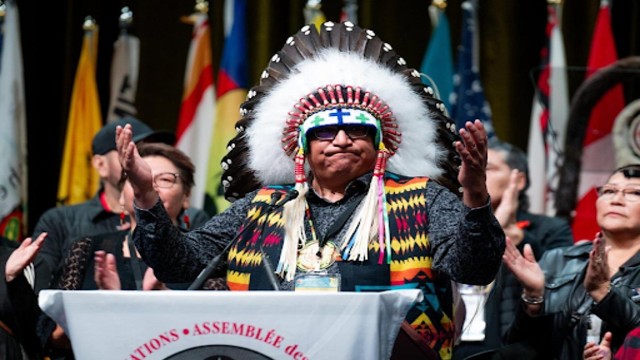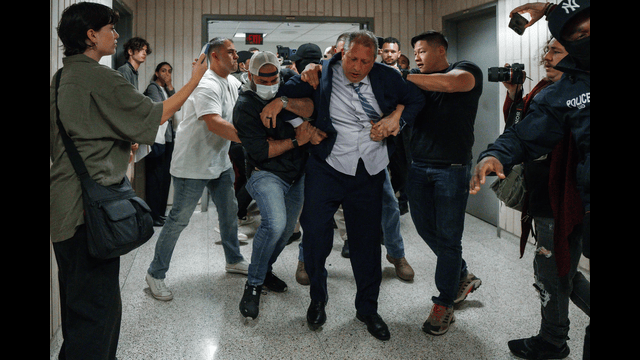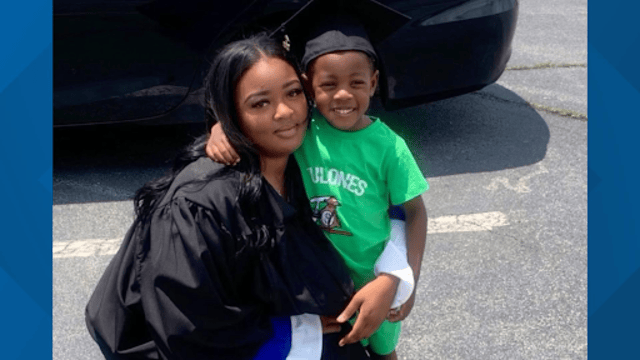
David Pratt delivers remarks after conceding to National Chief of the Assembly of First Nations-elect Cindy Woodhouse during the third day of the special chiefs assembly in Ottawa on Thursday, Dec. 7, 2023. THE CANADIAN PRESS
Dozens of First Nations leaders stood united outside Parliament Hill on Monday, delivering a powerful message to King Charles as he began his royal visit to Canada: Respect the treaties.
King Charles and Queen Camilla arrived in Ottawa for their first Canadian tour since his coronation two years ago. But while political leaders welcomed the royals, many Indigenous leaders were left out — and they made their absence known.
In front of a teepee set up on the lawn, David Pratt, Vice Chief of the Federation of Sovereign Indigenous Nations, addressed the crowd with a clear reminder.
“Treaties were meant to foster mutual respect,” he said. “They were about preserving our rights — to hunt, trap, fish, and trade freely. What we see now is oppression. Our leaders want to meet the King face-to-face. He must be reminded of his responsibilities under treaty.”
Left Out Again
Parliament reopened the same day the King landed. While Prime Minister Mark Carney and Governor General Mary Simon were both scheduled to meet the monarch, Indigenous leaders were not on the original guest list.
Assembly of Manitoba Chiefs Grand Chief Kyra Wilson expressed deep frustration.
“We hear 'nation-to-nation' all the time,” she said. “But when it matters most — when the King is present — our voices are excluded. We are not invited.”
By late afternoon, that changed slightly. The royal itinerary was updated to include audiences with three national Indigenous leaders: Cindy Woodhouse Nepinak of the Assembly of First Nations, Natan Obed of Inuit Tapiriit Kanatami, and Victoria Pruden of the Métis National Council.
A Relationship in Need of Renewal
Wilson emphasized that these talks must go beyond symbolism.
“We are ready to move forward in our relationship with the Crown,” she said. “But Canada must stop making decisions for us. That era is over. It’s time for a true reset.”
This means acknowledging Indigenous rights as foundational, not optional. Leaders insisted that the Crown, and Canada by extension, must stop dictating the future of Indigenous communities.
More Than Symbolism — Action Is Needed
Beyond treaty recognition, leaders outlined a broader list of urgent needs.
They called on the federal government to overhaul the child welfare system. They demanded protection for traditional lands. And they stressed the dire need for infrastructure improvements across Indigenous communities.
Grand Chief Trevor Mercredi of Treaty 8 First Nations spoke with resolve.
“Our lands generate billions, maybe trillions of dollars every year,” he said. “But our people see none of it. We’re not here for photo ops. We’re here to fight for what’s owed to us — the treaties.”
He didn’t shy away from what might come next.
A Historic Stand by First Nations leaders for a Long-Ignored Promise
Monday's gathering was more than a protest. It was a declaration — a firm stand for justice and recognition.
“If lawsuits are what it takes for the King, the prime minister, and the premiers to finally understand — we’ll do it. Again.”
Indigenous leaders made it clear: the treaties are not relics of the past. They are living agreements. And it’s time Canada, and the Crown, honoured them.















